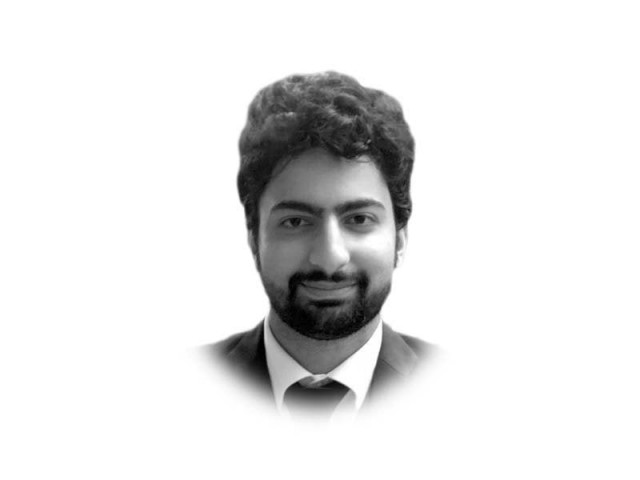Streets of rage
While we laud the protests in America and India, we spurn the ones in our own country tackling injustice

The writer is a lawyer, formerly practising and teaching law in Lahore, and currently based in Singapore. He holds an LLM from New York University where he was a Hauser Global Scholar. He tweets @HNiaziii
In 2013, when George Zimmerman was acquitted for the killing of 17-year-old Trayvon Martin, civil rights activist Alicia Garza coined the phrase “Black Lives Matter”. Seven years later, the phrase has reached its peak as a galvanising cry against racial injustice.
For over 10 days, Americans have watched as protests paralleling the civil rights movement erupted across the country. The majority of protestors have taken to the streets by speaking the language of Martin Luther King Jr: the peaceful protest.
A small minority has taken to the language of riots.
This latter group has been condemned for choosing the path of violence to fight a system of racial injustice. Labelled no better than the police who killed Floyd, with right-wing pundits on Fox News calling them “domestic terrorists”.
To be sure, riots result in innocent people suffering, the destruction of property, communities being broken, and years of recovery. But it is incongruous to group those rioting in America in the same category as a police force that allows a man to be lynched in the streets. The reasons for why riots like this occur are far more nuanced than anything Fox News is capable of understanding.
“In the final analysis, a riot is the language of the unheard,” Martin Luther King explained. “As long as America postpones justice, we stand in the position of having these recurrences of violence and riots over and over again.” King abhorred violence, but he understood why it happened. Likewise, we can condemn violent protest while still sympathising with the injustice that causes it. After all, the riot, as a tool for political change, appears when systematic oppression causes people to believe that no other choice is left for them in order to be heard.
The peaceful protest, protected under the First Amendment to the American Constitution, is often suitable enough to allow groups who have faced injustice to vent their feelings to produce change. But over the years, the African American community has seen their legitimate demands for justice ignored by America’s leadership. Reaching a tipping point with the election of Donald Trump who became a lodestone for American racism to converge around.
The system appeared rigged against the community. Men like Ahmaud Arbery were killed for being black in a white neighbourhood. The prosecution department was reluctant to frame charges against the killers, arguing that they acted in self-defence. Breonna Taylor was unarmed when she was shot dead in her apartment by police officers in March. Studies suggest that black men are 3.5 times more likely to be killed by the police in America than white men; one in every 1,000 black men will die from police violence.
The community found itself helpless as police officers were found not guilty by a justice system that granted them qualified immunity.
When the traditional methods of obtaining justice fail, unconventional methods become feasible. Necessity created the strategy of civil disobedience, which proved successful in fighting oppressive regimes. It involves breaking the law without resorting to violence such as when the civil rights movement broke segregation laws in the American south.
Legal philosophy has grappled with the issue of when it is just to disobey the law. The answer seems to be when the traditional avenues of justice become so illusory that change can only be brought by disobedience. It is difficult to judge, from an objective standard, when this point exists. Leaving it to a contextual analysis in every situation. However, civil disobedience can pivot towards violent disobedience in the form of riots if the state exercises its coercive force in disproportionate ways.
When peaceful protest is answered by police firing rubber bullets that blind people, when crowds are dispersed using chemicals just so that the President can pose for a photo op, when police vehicles accelerate into crowds of protesters, and when a black man is arrested during a protest for going on one knee to say to the police, “all of you are my family” — expect a reaction.
Riots in these situations are caused by oppression. The more you oppress and silence a group fighting for their place on the table, the more likely you will force them towards violence. A state that fails to recognise this is a state with its head in the sand.
Here, there is a lesson for our country as well. We have taken up a trend of labelling the peaceful protester as treacherous. We see criticism of the status quo as rebellion. And while we laud the protests in America and India, we spurn the ones in our own country tackling injustice. It is horrifying when members of the government condone this attitude towards groups raising their voice against discrimination faced by people in Balochistan and Khyber-Pakhtunkhwa; the plight of religious minorities who have been subjected to a system of apartheid; the misogyny faced by women in all walks of life in Pakistan.
We are a tinderbox as well, the question is: will we do something to prevent the flame?
Published in The Express Tribune, June 9th, 2020.
Like Opinion & Editorial on Facebook, follow @ETOpEd on Twitter to receive all updates on all our daily pieces.















COMMENTS
Comments are moderated and generally will be posted if they are on-topic and not abusive.
For more information, please see our Comments FAQ